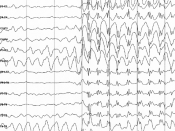Background:
Epilepsy is also referred to as seizure disorder; it is a chronic brain disorder that briefly interrupts the normal electrical activity of the brain to cause seizures. These seizures can be characterized by a variety of symptoms including uncontrolled movements of the body, disorientation or confusion, sudden fear, or loss of consciousness. Epilepsy may be a result from a head injury, stroke, brain tumor, lead poisoning, or genetic conditions. An interesting fact about epilepsy is that in over 70 percent of the cases no cause has been identified. Did you know that about 1 percent of the world population, or over 2 million people, are diagnosed with epilepsy (Epilepsy Foundation)?
Types and causes of Seizures:
A person has a seizure when there is an abnormal discharge of electrical energy in certain brain cells. The discharge spreads to nearby cells, and the effect may be loss of consciousness, involuntary movements, or abnormal sensory phenomena.
The effects of the seizure will depend on the location of the cells in which the discharge starts and how far the discharge spreads. Like stated before about 1 percent of the population is diagnosed with epilepsy but did you know that about 6 percent of the population will have a seizure in their lifetime? Most of that 6 percent of people will not be diagnosed with epilepsy because they do not have seizures on a constant basis. Since seizures reflect abnormal brain activity, it is not surprising that epilepsy is found in a greater amount in children with developmental disabilities (mental retardation or cerebral palsy) than those without a disability.
Seizures can be caused by almost any kind of damage to the brain, the most common causes are; a lack of sufficient oxygen, low blood sugar, infections, and a physical trauma. But...



Epilepsy...
As someone who's neighbor and friend has epilepsy...I can say without a doubt that this piece is accurate, informative, and well researched. On a grammatical note...this piece has good unity. This paper is also a good research tool for someone studying the topic. Great Job.
1 out of 1 people found this comment useful.